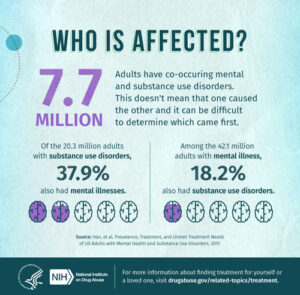LEARN MORE, PRACTICE DIFFERENTLY, AND FEEL CONFIDENT WORKING WITH CLIENTS BY JOINING US FOR A SEMINAR ON, “NEW STRATEGIES FOR SUBSTANCE USE ASSESSMENT,” ON FEBRUARY 20, 2019, 9:30AM – 4:30PM
âHe used K2, cocaine, and heroin. He says he takes his medications, but he keeps going in and out of the hospital. And the team does not know what to do,â lamented Maryann, the clinician on the HOPE ACT team, discussing the case with Rodis, the team consultant. Maryann was alluding to Raj, who often meets with her, but she wonders whether he really wants to get better.
Substance Use Disorder is a chronic condition that requires long-term care, and any progress made often waxes and wanes. Like Maryann, you may similarly work with patients and clients affected by Substance Use Disorder, and you may no longer know what to do. Part of the answer starts with an effective comprehensive strategies to working with individuals with substance use disorder.
Below are five benefits that derive from learning new strategies to working with individuals with substance use disorder:
Patient and Client Related Benefits
-
Better care for our patients and clients
Sometimes we fail to ask our patients and clients about their current use or history of substance use. When we do, we either ask it as a âmatter of factâ or stop after the first one or two questions, or we simply do not know what the next questions should be. âMaryann, what is Rajâs pattern of use, and what has been the evolution of his use,â asked Rodis. âI must confess, I never even thought about asking him,â replied Maryann. âWith the new strategies to working with those with substance use disorder, you will know the right questions to ask, how to ask them, and you will be able to formulate a plan to provide better care for Raj. Letâs get to work.â  Rodis and Maryann began developing a plan the lead effective and comprehensive strategies.
-
Better use of our countertransference and biases for the benefit of our patients and clients
âThe team does not know what to doâ¦frankly, he is not a favorite, and we have been making much more of an effort with Ron, who does not use drugs, than with him.â  Maryann was referring to Raj, who, we know, uses K2, cocaine, and heroin. It is a human tendency, ethical, and acceptable to like Ron better than Raj. For we all have our preferences. It becomes questionable, however, when we start neglecting Raj and not stop to think or reflect on why,â whispered Rodis.
âI never thought about it that way before, but, now, I think I hate Raj. It has been exhausting working with him; he
Clinician and Advocate and Staff Related Benefits
-
Promotion of integrated substance use treatment and mental health care

-
Improvement of our advocacy skills on behalf of patients and clients affected by substance use disorders
âIt is not just about motivation; it is more complicated than that. We have been waiting for Raj to just get motivated,
-
Provide better education and the tools to decrease stigma against substance use disorders
As Maryann stated, it is not just about motivation, it is more complicated than that. Many of us prefer the simplistic view that substance use is a âproblem of character.â Â Some firmly believe, âYou just need to have more will power, and you will be motivated to stop.â
With the new strategies to working with individuals with substance use disorder, you will feel armed and empowered with the right tools, to educate the various stakeholders, fight against the stigma of Substance Use Disorder, and help others understand that having a loved one admitted to the Medical Intensive Care Unit (MICU) for a diabetic coma, for failing to take his or her medications or for failing to follow the recommended behavioral modifications, is not much different than having a patient or client relapse on cocaine, after promising to remain âclean.â
After a lengthy discussion with Rodis, Maryann admitted that she did not know the right questions to ask someone
You may be failing to provide the right care to your patients and clients with substance use disorder. You may also be using your counter transference and biases to their detriment, unknowingly and unintentionally. Learning the new strategies to working with individuals with substance use disorder will help you avoid falling into this trap. It will also help you promote and practice integrated substance use treatment and mental health care; improve your awareness and advocacy skills on behalf of your patients and clients with substance use disorders; and become a passionate educator to help decrease stigma against substance use disorders.